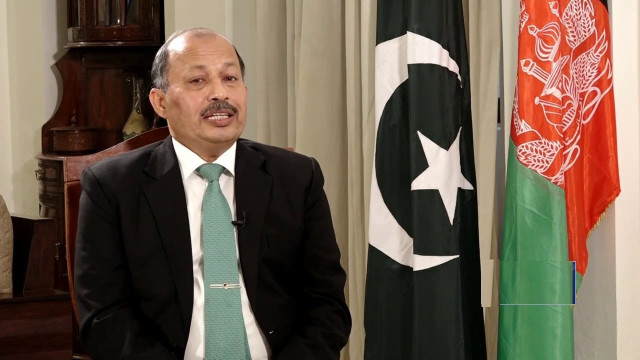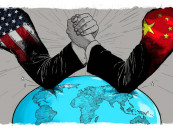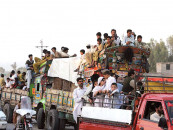Pakistan bets on peace in Afghanistan
Islamabad's envoy in Kabul says both countries and the region will benefit from stability

With the two-decade-long US occupation of Afghanistan over, Pakistan seeks a negotiated political settlement that leads to the formation of an inclusive administration in its conflict-ridden northwestern neighbour.
Contrary to the narrative being weaved against it by certain quarters, Pakistan’s top diplomat in Kabul said Islamabad is committed to an inclusive political settlement in Afghanistan.
“After decades of conflict, Afghanistan needs a comprehensive political settlement for lasting peace and stability,” said Ambassador Mansoor Ahmad Khan.
Reiterating Islamabad’s stance, Ambassador Khan stated: “Pakistan has always said that there is no military solution. There has to be a negotiated settlement that is widely accepted within Afghanistan.”
While the US and other western countries struggled with the final exit from Afghanistan on Tuesday, Pakistan continued to rescue Afghans and other nationals. According to Khan, who is one of the four ambassadors currently stationed in the Afghan capital, Islamabad has always stepped up to the challenge when it comes to Afghanistan, and that, he said, defines the special relationship between the two countries.
“Afghanistan and Pakistan not only share the longest border, they are also closely connected in many ways. We have the same religion on both sides of the border, we have the same culture, same language in many areas, and our people are very similar,” the diplomat said during the no holds barred interview.
Since the collapse of the Western-backed Ashraf Ghani government in Kabul more than two weeks ago, analysts in the US and elsewhere have been quick to blame Pakistan for the failure in Afghanistan. Some, including a known Bush administration neo-conservative, John Bolton, aimed his guns at Pakistan in a recently penned op-ed piece.
Read Germany thanks Pakistan for supporting Afghanistan evacuations
Bolton, who also served as Donald Trump’s national security adviser went on to say that Pakistan has always been a supporter of the Taliban. In the piece, the Bush-era war-hawk took several potshots at the government in Islamabad.
Ambassador Khan, however, rejects all such accusations against Pakistan.
Responding to a question about Islamabad’s role in Kabul, the diplomat, in a firm and unequivocal manner, said that a stable Afghanistan was in the best interest of Pakistan and the entire region.
“Peace and stability in Afghanistan means peace and stability in Pakistan. It means, economic growth, economic engagement and interaction for both countries,” explained Khan over phone from Kabul.
The diplomat said Pakistan has suffered consistently during the decades long conflict in Afghanistan. “We have suffered the most from the Afghan conflict. Islamabad and Kabul will benefit once there is peace and when the dust settles on the other side of the border.”
Optimistic about the ongoing efforts to form an inclusive government in Kabul, the ambassador said once lasting peace is achieved in Afghanistan, both nations could benefit from economic exchanges and greater connectivity. “Given the changing dynamics in the region, a peaceful Afghanistan can benefit more than an unstable Afghanistan,” he added.
Afghanistan, Ambassador Khan said, is standing at a crossroads. “We can collectively help Afghans, bring an end to the internal conflict through a participative process, through an inclusive political process that leads to the formation of a new political system, a new government, which has participation of all ethnic groups,” explained Ambassador Khan. The new government, he said, will have to earn the confidence of the Afghan people and respect all international norms to gain greater recognition.
Also read Taliban seek Pakistan’s help in resolving Afghan matter
Once Afghanistan has peace, the ambassador said, the country will usher into an era of economic stability. “Peace in Afghanistan will enable greater connection between South Asia, Pakistan, Afghanistan, Central Asia and Eurasia,” said Khan.
Presenting a forecast of the future, the envoy said Afghanistan could connect with the rest of the world using Pakistan’s ports. “And through the China Pakistan Economic Corridor (CPEC), Afghanistan could also benefit in terms of infrastructure,” the envoy added.
Western analysts who have been commenting on the Taliban’s sweeping victory in Afghanistan and the subtle assurances from Beijing, have already declared the situation as a victory for China. “It is an opportunity for Beijing to extend its influence across the region,” said Shuli Ren, Bloomberg Opinion columnist, in her latest article about the abrupt US exit from Afghanistan for more than two decades. Based on Ambassador Khan’s assessment from Kabul, Ren’s prediction may even come true for Beijing.
When asked what are Pakistan’s hopes for its war-torn neighbour, the ambassador said: “We hope that Afghanistan will utilize this historic opportunity in order to bring an end to decades of conflict, and enter into an era of peace, progress, and prosperity, not only for itself, but for regional peace, progress, and stability.”



















COMMENTS
Comments are moderated and generally will be posted if they are on-topic and not abusive.
For more information, please see our Comments FAQ